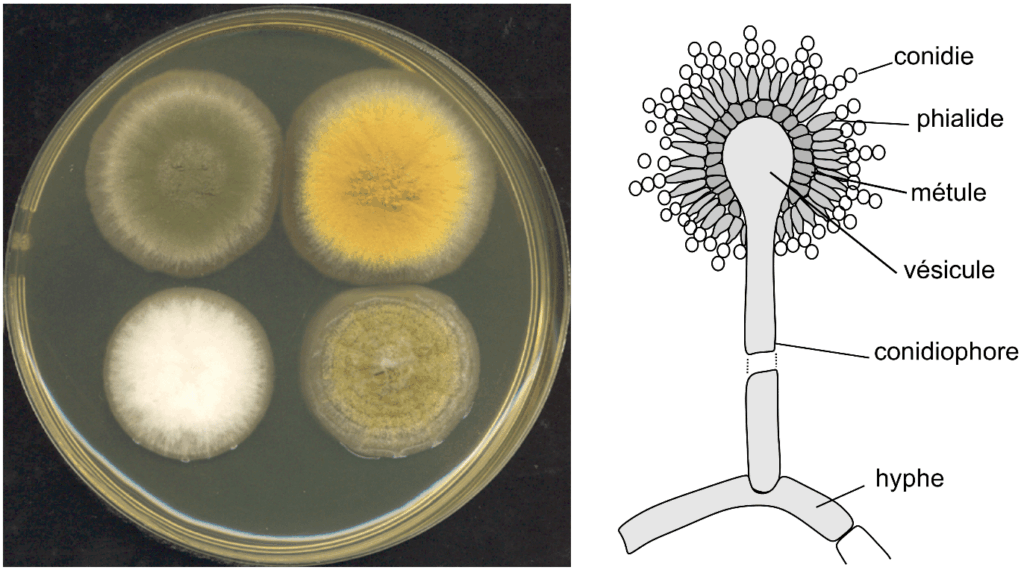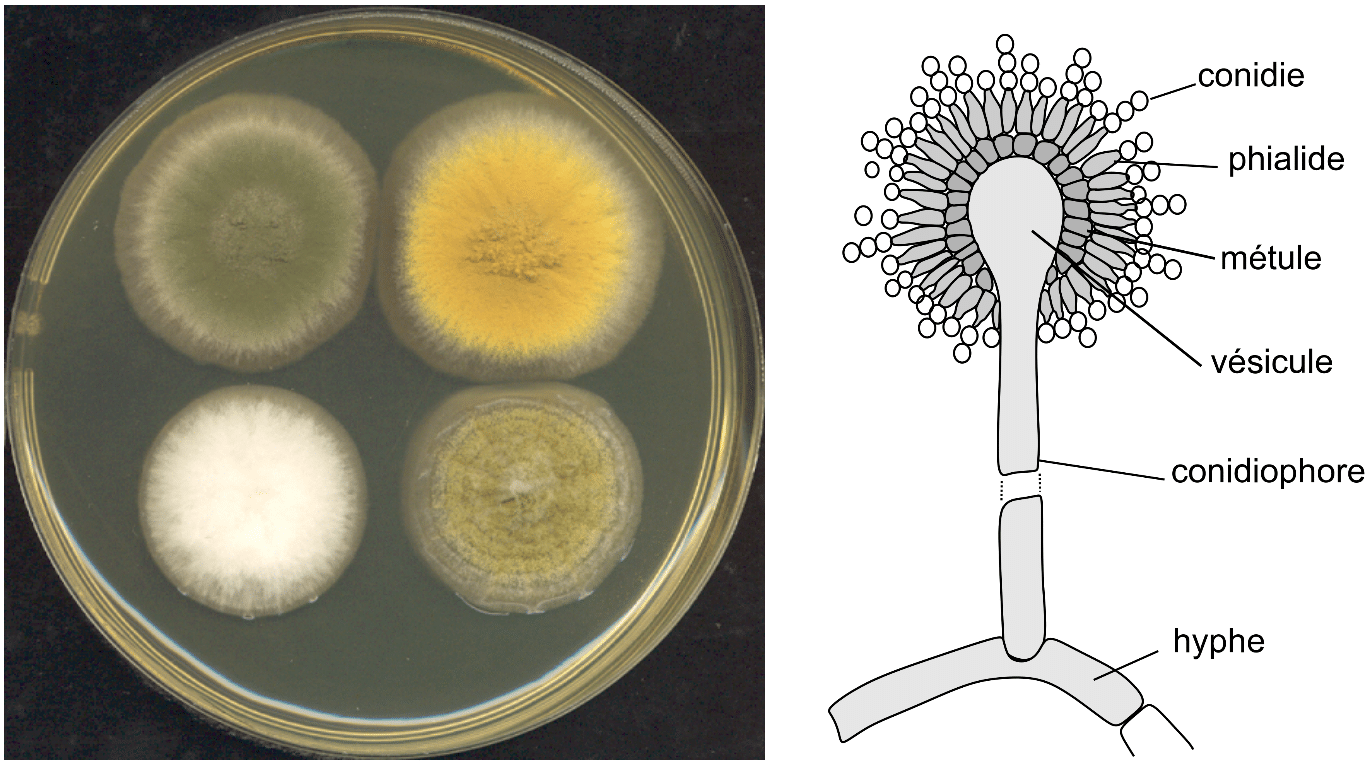
Natural Approaches to Aspergillus Treatment: Exploring Complementary Therapies
Aspergillosis, an infection caused by the Aspergillus mold, can manifest in various forms, ranging from mild allergic reactions to severe invasive diseases. While conventional medical treatments, such as antifungal medications, are crucial in managing these infections, many individuals are also exploring natural approaches to Aspergillus treatment. This article delves into the realm of complementary therapies that may support conventional treatments and enhance overall well-being for those affected by Aspergillus. It’s crucial to emphasize that these natural approaches should be discussed with a healthcare professional and should not replace prescribed medications. The goal is to provide an informative overview, enabling informed decisions about integrative healthcare strategies.
Understanding Aspergillosis and its Treatment
Aspergillus is a common mold found both indoors and outdoors. Most people breathe in Aspergillus spores daily without any adverse effects. However, individuals with weakened immune systems, underlying lung diseases, or allergies are more susceptible to developing aspergillosis. Different types of aspergillosis include:
- Allergic bronchopulmonary aspergillosis (ABPA)
- Aspergilloma (fungus ball)
- Invasive aspergillosis
- Chronic pulmonary aspergillosis
Conventional treatment typically involves antifungal medications like voriconazole, itraconazole, or amphotericin B. Surgery may also be necessary in some cases, particularly for aspergillomas. The severity of the infection and the patient’s overall health dictate the specific treatment plan. However, the side effects of some antifungal medications can be significant, leading some individuals to seek complementary therapies to alleviate symptoms and support their body’s natural defenses. The exploration of Aspergillus treatment naturally is often driven by a desire to minimize side effects and improve quality of life.
Boosting Immune Function: A Foundation for Natural Aspergillus Treatment
A strong immune system is the body’s first line of defense against infections, including aspergillosis. Several natural strategies can help bolster immune function:
Dietary Considerations
A balanced and nutritious diet is essential for a healthy immune system. Focus on consuming plenty of fruits, vegetables, lean protein, and whole grains. Specific nutrients that support immune function include:
- Vitamin C: Found in citrus fruits, berries, and leafy greens.
- Vitamin D: Can be obtained through sunlight exposure, fortified foods, or supplements.
- Zinc: Present in seafood, meat, nuts, and seeds.
- Selenium: Found in Brazil nuts, tuna, and eggs.
Additionally, limiting processed foods, sugary drinks, and excessive alcohol consumption can help reduce inflammation and support immune function. Probiotic-rich foods like yogurt, kefir, and sauerkraut can promote a healthy gut microbiome, which plays a crucial role in immune regulation. Considering dietary changes is a fundamental aspect of Aspergillus treatment in a natural context.
Lifestyle Factors
Beyond diet, several lifestyle factors contribute to a robust immune system:
- Regular Exercise: Moderate physical activity can enhance immune cell function and reduce inflammation.
- Adequate Sleep: Aim for 7-8 hours of quality sleep per night to allow the body to repair and rejuvenate.
- Stress Management: Chronic stress can suppress immune function. Practice relaxation techniques like meditation, yoga, or deep breathing exercises.
Addressing these lifestyle factors can significantly impact the body’s ability to fight off infections and may complement conventional Aspergillus treatment strategies.
Specific Natural Remedies for Aspergillus Treatment Support
While not a substitute for prescribed medications, certain natural remedies have shown promise in supporting immune function and potentially inhibiting fungal growth. It’s important to consult with a healthcare professional before incorporating any of these remedies into your treatment plan. Always prioritize evidence-based approaches and consider potential interactions with medications.
Garlic
Garlic contains allicin, a compound with potent antifungal and antibacterial properties. Studies have shown that allicin can inhibit the growth of various fungi, including Aspergillus. Garlic can be consumed raw, cooked, or in supplement form. However, it may interact with certain medications, such as blood thinners, so caution is advised. The role of garlic in natural Aspergillus treatment is being actively researched.
Oregano Oil
Oregano oil is another natural remedy with antifungal properties. It contains carvacrol and thymol, which have been shown to disrupt fungal cell membranes. Oregano oil is typically taken internally in diluted form or applied topically (diluted with a carrier oil). It’s important to use high-quality oregano oil and follow recommended dosage guidelines. Oregano oil could be a complementary addition to Aspergillus treatment.
Tea Tree Oil
Tea tree oil is well-known for its antiseptic and antifungal properties. While primarily used topically, some studies suggest it may also have potential benefits against Aspergillus when inhaled (through steam inhalation, after consulting a doctor). However, tea tree oil should never be ingested. Its use in Aspergillus treatment is limited to external applications.
Probiotics
As mentioned earlier, a healthy gut microbiome is crucial for immune function. Probiotics, which are beneficial bacteria, can help restore balance in the gut and support the immune system. Certain strains of probiotics, such as Lactobacillus and Bifidobacterium, have shown potential in inhibiting fungal growth. Probiotics can be obtained through fermented foods or supplements. They play a supportive role in the broader context of Aspergillus treatment.
Grapefruit Seed Extract (GSE)
Grapefruit seed extract is derived from the seeds and pulp of grapefruits and is often touted for its antimicrobial properties. Some studies suggest that GSE may possess antifungal activity against Aspergillus. However, more research is needed to confirm these findings and determine the optimal dosage and safety profile. The use of GSE in Aspergillus treatment requires further investigation.
Environmental Considerations: Reducing Aspergillus Exposure
Minimizing exposure to Aspergillus spores can also play a role in preventing and managing aspergillosis. Several environmental strategies can help reduce exposure:
- Improve Indoor Air Quality: Use air purifiers with HEPA filters to remove airborne particles, including mold spores. Ensure proper ventilation in damp areas like bathrooms and kitchens.
- Control Moisture: Repair leaks promptly and use dehumidifiers to maintain low humidity levels (below 50%). Mold thrives in damp environments.
- Clean Regularly: Regularly clean surfaces, especially in areas prone to mold growth. Use mold-killing cleaning products.
- Avoid Exposure to Compost and Decaying Vegetation: Aspergillus is commonly found in compost piles and decaying vegetation. Wear a mask when handling these materials.
These environmental controls are an important preventative measure and adjunct to any Aspergillus treatment plan.
The Importance of a Holistic Approach
Managing aspergillosis effectively often requires a holistic approach that combines conventional medical treatments with complementary therapies and lifestyle modifications. A holistic approach considers the individual’s physical, emotional, and mental well-being. This involves working closely with a healthcare team, including physicians, nutritionists, and other healthcare professionals, to develop a personalized treatment plan. The exploration of natural Aspergillus treatment should always be conducted under the guidance of qualified healthcare providers.
Caution and Considerations
It is crucial to emphasize that natural remedies should not be considered a substitute for conventional medical treatment for aspergillosis. Antifungal medications are often necessary to control the infection and prevent serious complications. Natural remedies should be used as complementary therapies to support conventional treatment and enhance overall well-being. Always consult with a healthcare professional before starting any new treatment, especially if you have underlying health conditions or are taking medications. They can help you determine if a natural remedy is safe and appropriate for you. The primary focus should always be on evidence-based Aspergillus treatment strategies.
Future Research Directions
Further research is needed to fully understand the efficacy and safety of natural remedies for aspergillosis. Clinical trials are necessary to evaluate the potential benefits of specific natural compounds and to determine the optimal dosage and administration methods. Research should also focus on identifying potential interactions between natural remedies and conventional medications. The future of natural Aspergillus treatment relies on rigorous scientific investigation.
Conclusion
While conventional medical treatments remain the cornerstone of aspergillosis management, natural approaches can play a supportive role in enhancing immune function, reducing inflammation, and potentially inhibiting fungal growth. A combination of dietary modifications, lifestyle changes, and specific natural remedies, under the guidance of a healthcare professional, may contribute to improved outcomes and overall well-being. Remember that Aspergillus treatment requires a comprehensive and individualized approach, prioritizing patient safety and evidence-based practices. Always consult with your doctor to determine the best course of action for your specific situation. [See also: Understanding Aspergillosis: Symptoms, Diagnosis, and Treatment Options], [See also: Boosting Your Immune System Naturally: A Comprehensive Guide], [See also: The Role of Diet in Managing Fungal Infections].

